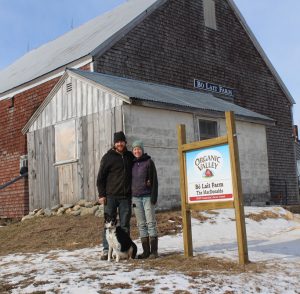Hitting Pay Dirt
UMaine Researcher, Undergraduate, Partners Awarded Grant for MidCoast Composting Project
As part of an interdisciplinary team examining ways to reduce food waste in Maine, a researcher in the UMaine School of Economics and his undergraduate student assistant were recently awarded $17,000 from the Maine Department of Environmental Protection (DEP) towards a start-up composting program in the MidCoast region. The funds will go to project partners Bó Lait Farm of Washington, Maine and ScrapDogs Community Compost of Camden, Maine to implement a food scrap collection and processing system in the region.
Researcher Travis Blackmer and undergraduate Taylor Patterson are part of a project called “Making Maine’s local food system sustainable” being conducted by a team of researchers and students affiliated with the Mitchell Center. Patterson is one of five undergraduate scholars being funded by the Diana Davis Spencer Foundation to conduct the research.

The DEP grant is being used to purchase hauling equipment, large 32-gallon toters and a trailer for ScrapDogs, and a new gravel composting pad and composting equipment where Bó Lait can process the food scraps and manure to begin the composting cooking process.
“We’ve been working with Bó Lait since April,” Blackmer reports. “And the reason we picked MidCoast Maine as the focus of our efforts is because it’s an area with a high number of sustainability and zero-waste groups, but they don’t have any composting businesses that do anything related to community-oriented composting.”
The team worked closely with DEP and the Maine Department of Agriculture to locate the Washington dairy farm run by Connor and Alexis MacDonald, who were anxious to join ranks in a startup composting business.
ScrapDogs, the waste collector, hauler, and processor, came on board in July and focuses on households, restaurants, and other small food waste producers. Tessa Rosenberry and Davis Saltonstall of ScrapDogs were met with enthusiasm by their community and quickly have outgrown their pilot site in downtown Camden.
Notes Rosenberry and Saltonstall of ScrapDogs, “The Mitchell Center team has played a crucial role in fostering our partnership with Bó Lait, taking the lead on writing the DEP grant and really capturing our intentions and the impact this endeavor can have on the region. We couldn’t have gotten to where we are without Travis and Taylor.”
Bó Lait will be on the compost production side given their access to the cow manure needed to mix with the food waste, the space at their farm, and because they have the tractors and other equipment needed to produce high-quality compost.
“We are very excited to provide a necessary service to this area, and to create a value-added product from otherwise discarded materials,” say the MacDonalds. “We always had an interest in composting, but if it wasn’t for the folks with the Mitchell Center we would not have been able to begin with this process of starting a composting business.”
“I like to call this the ‘MidCoast Composting Cooperative’—two companies that are separate but are partners,” says Blackmer, who is one of a handful of researchers on the Mitchell Center’s Materials Management team.
Blackmer notes that while he and Patterson worked as the marketing, outreach, client recruitment, and education arm of Bó Lait before it partnered with ScrapDogs, “At this point we’re hoping we’re less integral because that’s what ScrapDogs wants to do—they want to be the marketing/outreach arm, host community gardening and composting seminars and educational seminars in schools. Our focus now is on optimizing the process’ and to focus on the financial performance of the project on both sides, collection and compost production.”
—David Sims
